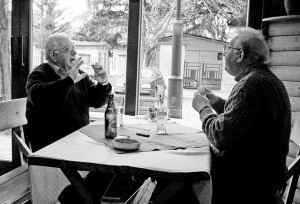Talking About Hobbies in German Posted by Larissa on Oct 19, 2015 in Language
Servus, I got my inspiration for this post over on the Greek blog (which you can find here if you’re also interested in learning Greek). Hobbies are an important part of everyday life and are a great way to start up a conversation, whether it’s horse riding, painting, reading, or just going to the cinema!
The German language has taken the English word “hobby”, making it one less German word for you to remember. If you wanted to ask “what are your hobbies?” in German it would be “Was sind deine Hobbys?”. However you could also say “Was sind deine Interessen?” – “What are your interests?”.
Here are a few hobbies I translated into German, if you have one that isn’t up here than leave me a comment and I can translate it for you!
Horse riding reiten
Reading lesen
Painting malen
Dancing tanzen
Going to the cinema ins Kino gehen
Swimming schwimmen
Writing schreiben
Meeting up with friends mit Freunden treffen
Travelling reisen
Fishing angeln
Doing sport Sport machen
If you want to ask someone what their favourite hobby is (maybe they’ve listed you a hundred hobbies already and you want to narrow it down) then ask “was ist dein Lieblingshobby?”/”was ist deine Lieblingsinteresse?”. The word lieblings means “favourite” so you can use this for other questions too, such as Lieblingsessen (favourite food), Lieblingsfach (favourite subject), Lieblingsbuch (favourite book) and so on.
When someone asks you what your hobbies are, you can reply by saying “Meine Hobbys sind…” (My hobbies are…) or if you just have one hobby then say “Mein Hobby ist…” (My hobby is…). In reply to your favourite hobby you can say “Mein Lieblingshobby ist…” (My favourite hobby is…), or if you’re indecisive and can’t pick one favourite hobby you can reply “Ich liebe alle meine Hobbys, ich kann mich nicht entscheiden!” (I love all of my hobbies, I can’t decide!).
Now that you know what to say here is an example of how the conversation could go:
Person 1: Was sind deine Hobbys? / Was sind deine Interessen?
(Note that the question has „sind” instead of “ist” in it which means it is plural)
Person 2: Meine Hobbys sind Schwimmen und ins Kino gehen.
Person 1: Ich mag auch Schwimmen! Was ist dein Lieblingshobby?
Person 2: Mein Lieblingshobby ist Schwimmen, ich schwimme drei mal pro Woche.
I haven’t written the translation so see if you can understand what they’re saying to each other!
Thanks for reading 🙂
Larissa

Build vocabulary, practice pronunciation, and more with Transparent Language Online. Available anytime, anywhere, on any device.
About the Author: Larissa
Hello I'm Larissa. I live in Germany and I am half German and half English. I love sharing my passion for Germany with you through my posts! Apart from writing posts I teach fitness classes in Munich.






Comments:
Alcazar:
Nice article.
Yes “hobby” has become the new german word for this, but there is actually an old german word for – “Steckenpferd”.
(in english hobby-horse 🙂
Thanks.
Larissa:
@Alcazar Hi Alcazar,
I haven’t heard of “Steckenpferd” before so thank you for the info! 🙂
Larissa
Constantinus:
Instead of “Sport machen”, it should be “Sport treiben”.
Larissa:
@Constantinus Hi Constantinus,
You’re right you can also say “Sport treiben” but both are correct 🙂 It’s completely normal to say “Ich mache sport” as well!
Thanks for the comment,
Larissa
Trish:
@Constantinus Yes, I heard from a young adult German person recently that Sport ‘treiben’ is a little outdated and most say Sport ‘machen’ now 🙂
Maier Alina:
Yes “hobby” germani
Lisa Gorrell:
Hi,
I have several hobbies:
birdwatching = vogelbeobachten
genealogy = Geneologie
and model railroading. How do the Germans call modeling trains?
Larissa:
@Lisa Gorrell Hi Lisa,
Thanks for sharing your hobbies! A model railroad is “Eisenbahnmodel” in German. You could say “Ich habe eine Modelleisenbahn” – “I have a model railroad”.
Hope this helps 🙂
Larissa
Neetu:
Gud
Jeff:
Look at ur hairline
cupcake:
would the gehen change acording to who you were adressing, for example du?
Larissa:
@cupcake Hello!
Yes it would:
“du gehst”
“Ich gehe”
“wir gehen”
Thanks for commenting, I hope that helps 🙂
Larissa
SSABAGEREKA SAMUEL:
Hallo ich einen Deutsch Lehrer aus Uganda , ,lightning. Danke schön ich magge deine unterrichten…..
rinea:
super. das ist toll
rinea:
super
Avin:
Nice… I had to refer to your website to understant how to express my hobbies to a potential employer in Germany.
It was helpful. Thanks!
Avinash.
Singapore.